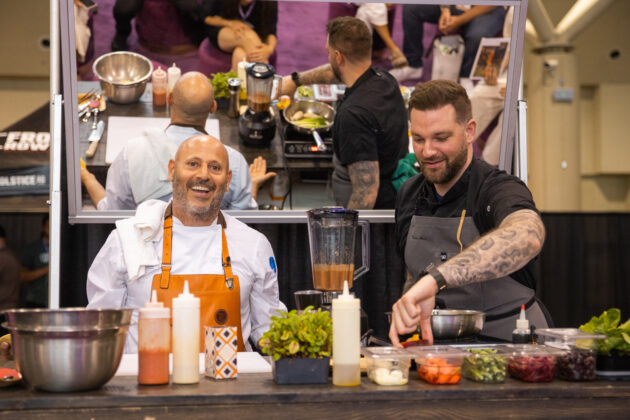
Features
Opinion
Business
Events
International
Marketing
Lift Events & Experiences, Toronto 2023: Cannabis business five years later
Lift Events & Experiences hosted a conference and expo showcasing the latest in domestic marketing, global ventures and immersive experiences
June 6, 2023 By Haley Nagasaki
 Photo: Lift Events & Experiences
Photo: Lift Events & Experiences Earlier this year, Grow Opportunity celebrated five years in trade media as our inaugural issue went to print Fall 2017, pre-dating the legalization of cannabis in Canada by one year. As we return for the semi-annual Lift Events & Experiences on domestic soil, marked changes in the show guide from previous years demonstrate a pivot away from investment financing to the more tangible topics of production, data collection, marketing and retail.
International expansion remains high on the list of industry priorities as the Lift Cannabis Business Conference (LCBC) presented a review on how new and established international markets compare to the Canadian industry, moderated by Deepak Anand head of international consulting at GPS Global.
Panelist Trina Fraser partner at Brazeau Seller Law relays lessons learned from a taxation perspective that other countries might learn from Canada. Mainly: “don’t overtax the regulated industry.”
Anna-Sophia Kouparanis, co-founder of Bloomwell Group (Germany) spoke of the many options for international cultivators in the medical cannabis market in Germany today, as well as the tremendous opportunity the country faces once further and final details emerge on the recreational front.
Guillermo Delmonte, founder of NDLATAM (Uruguay) provided his thoughts on the growing and burgeoning LATAM markets such as Uruguay and Colombia — the former being the first country to legalize non-medical cannabis, while the latter recently shifted to allow flower export.
Yet industry excise duty is still the most problematic tax in this country, implemented beneath the theory that regulators can “start strict and loosen restrictions over time,” said Fraser, “because this is easier than tightening up later.” Though clearly it’s a challenge to reclaim tax revenues from levels of government after they’ve been receiving them.
Fraser encourages international players to “start lower and increase over time if needed.”

Photo: Lift Events & Experiences
Five years in trade media
Fraser told Grow Opportunity: “in the 10 years I’ve been in this industry, I’m constantly surprised by changes.” For that reason, she reserves predictions but indicates general perceived trends. “Over the next five years, there will likely be fewer retailers and fewer producers. But eventually, we will achieve some sort of equilibrium.”
“Virtually none of my corporate clients are the same as they were five years ago,” said Fraser, touching on the second or perhaps third wave the industry has recently entered where those joining the market now are buying up assets and starting over without the debt load of the first wave.
“Five years ago, stores couldn’t hire fast enough; they couldn’t find product. And now [producers] can’t get a listing in the OCS. Even international is up and down,” she concluded.
“Truth to Power” presentations
Attorneys Carlo DiCarlo and Gerald Chan at Stockwoods LLP disclosed critical lessons from the CannTrust class action case.
DiCarlo and Chan pinpointed the regulatory ambiguity and potential misunderstandings that played a role in this case with the key takeaway that in any business, there’s the temptation to move quickly but because cannabis is a highly regulated, highly visible new market, “there is virtue in slowing down when dealing with the regulations.”
There may be confusion surrounding what is and what isn’t required for compliance, yet regardless of the “build-up of public pressure,” it’s important to slow down and ensure that those enforcing the regulations understand them, and if not, it gets sorted at the moment of compliance rather than down the road in the public eye.

LCBC extraction panel. Photo: Lift Events & Experiences
Marketing and category growth
The concentrate panel during LCBC addressed how extraction and processing is outpacing all other segments of the industry. Moderator Adam Temple, CEO of Evolved Extraction Solutions, was joined by Brishna Kamal, president of Whistler Therapeutics, Andrew Fisher, CEO of Protonify, and Elad Barak, co-founder and CEO of Djot.
The panel pointed to the absence of expiration dates and the degradation of products, such as hash that lose potency at the one-year mark and must leave the facility within six months of being packed. Fisher encourages trade as international companies have largely “overcapitalized,” shipping mere kilos per month. Whereas in Canada, of course, “we do volume. And now we can go compete in the international markets,” he said.
Kamal emphasized the necessity of B2C marketing in this category, specifically due to the unregulated market offering “value and price we can’t touch.” Fisher added: “it’s not just about price, it’s about value — conveying value to the consumer.” A consumer “might buy a cheap ‘x’ but expensive ‘y’ if it gets them to where they want to go,” he said.
On the thread of cannabis marketing, the guerilla tactics needed in this industry were presented by a panel where ADCANN founder and editor Colin Bambury advocated for the potential of Canadian homegrown brands that must push the envelope in order to succeed.
Bambury explained how different or lax marketing regulations in other countries could enable companies to then come to Canada and capitalize off international brand recognition, instilling the need for homegrown brands to continue hashing out innovative marketing strategies such as optimizing social media, cross-promotion and PSAs for public health.

Chris Day, David Brown, Haley Nagasaki & Deepak Anand. Photo: Annex Business Media
Expo floor
International markets as well as consumer marketing continued to dominate conversations on Friday, along with data and operational efficiencies, and quality control — a C-45 panel moderated by StratCann’s David Brown.
Agility and brand loyalty achieved through trust is one way independent retailers have demonstrated an area of preparedness in this industry, said Shakir Tayabali, CEO of Independent Retail Cannabis Collective during a panel called “Independent retailers: thriving & surviving?”
Legacy cannabis brands were built upon trust while fulfilling a niche interest and the regulated market needs to get back there. To put it bluntly, shifting away from the mentality that views individuals as dollar signs is imperative at this point in the game. “Cannabis has always been about community and if we go back to that mentality then we can start to repair,” said Tayabali.
The retail, brand ambassador and budtender branch of the cannabis ecosystem that closes the loop — uniting producer and consumer — will help determine who will advance and who will perish in this uniquely friendly but fiercely competitive industry.
To top it all off, years of successful diner’s club demos and private events have spurred the evolution of Lift Events & Experiences.
Congratulations to Chef Jordan Wagman, author and director of cannabis food and beverage growth at Lift, who will begin a new chapter with Taste at Lift: Cannabis food and beverage experience, kicking off August 4, 2023 in San Francisco.

Chef Jordan Wagman. Photo: Lift Events & Experiences
Print this page